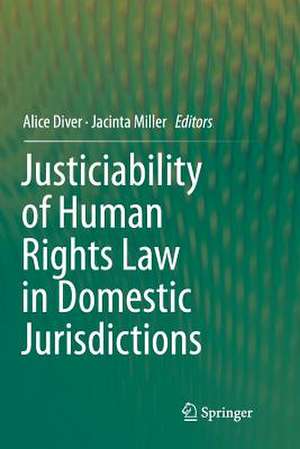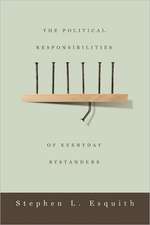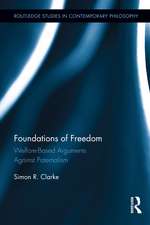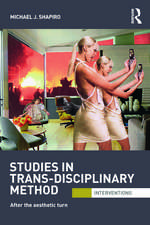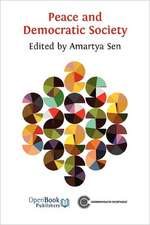Justiciability of Human Rights Law in Domestic Jurisdictions
Editat de Alice Diver, Jacinta Milleren Limba Engleză Paperback – 27 mar 2019
| Toate formatele și edițiile | Preț | Express |
|---|---|---|
| Paperback (1) | 647.92 lei 6-8 săpt. | |
| Springer International Publishing – 27 mar 2019 | 647.92 lei 6-8 săpt. | |
| Hardback (1) | 654.30 lei 6-8 săpt. | |
| Springer International Publishing – 18 dec 2015 | 654.30 lei 6-8 săpt. |
Preț: 647.92 lei
Preț vechi: 762.26 lei
-15% Nou
Puncte Express: 972
Preț estimativ în valută:
123.98€ • 135.21$ • 104.54£
123.98€ • 135.21$ • 104.54£
Carte tipărită la comandă
Livrare economică 24 aprilie-08 mai
Preluare comenzi: 021 569.72.76
Specificații
ISBN-13: 9783319795690
ISBN-10: 3319795694
Pagini: 422
Ilustrații: XXV, 422 p. 1 illus. in color.
Dimensiuni: 155 x 235 mm
Greutate: 0.63 kg
Ediția:Softcover reprint of the original 1st ed. 2016
Editura: Springer International Publishing
Colecția Springer
Locul publicării:Cham, Switzerland
ISBN-10: 3319795694
Pagini: 422
Ilustrații: XXV, 422 p. 1 illus. in color.
Dimensiuni: 155 x 235 mm
Greutate: 0.63 kg
Ediția:Softcover reprint of the original 1st ed. 2016
Editura: Springer International Publishing
Colecția Springer
Locul publicării:Cham, Switzerland
Cuprins
Jo Samanta, Enforcing Human Rights at End of Life: Is There a Better Approach?.- Jacinta Miller and Alice Diver, Can Rights be Ring-fenced in Times of Austerity? Equality, Equity and Judicial ‘Trusteeship’ over the UK’s Fairness Agenda.- David Hand, Chantal Davies and Ruth Healey, The Right to Healthcare: A Critical Examination of the Human Right of Irregular Migrants to Access State-Funded HIV/AIDS Treatment in the UK.- Jacinta Miller, Dignity: A Relevant Normative Value in ‘Access to Health and Social Care’ Litigation in the United Kingdom?.- Emmanuel Kolawole Oke, Patent Rights, Access to Medicines, and The Justiciability of The Right to Health in Kenya, South Africa and India.- Eghosa O. Ekhator, Rhuks Ako and Ngozi Stewart, Overcoming the (Non)justiciable Conundrum: The Doctrine of Harmonious Construction and the Interpretation of the Right to a Healthy Environment in Nigeria.- Deborah Magill, Justiciable Disability Rights and Social Change: A Northern Ireland Case Study.- Katie Boyle
, Economic, Social and Cultural Rights in Northern Ireland: Legitimate and Viable Justiciability Mechanisms for a Conflicted Democracy.- Francesca Capone, Children in Colombia: Discussing the Current Transitional Justice Process Against the Backdrop of the CRC Key Principles.- Hilmi Zawati, Prosecuting International Core Crimes under Libya’s Transitional Justice: The Case of Saif Al-Islam Gaddafi and Abdullah Al-Senussi.- Michelle-Thérèse Stevenson, DNA Evidence Under The Microscope: Why The Presumption Of Innocence Is Under Threat In Ireland.- Maria Helen Murphy, Surveillance and the Right to Privacy: Is an ‘Effective Remedy’ Possible?.- Roberto Cippitani, The ‘Contractual Enforcement’ of Human Rights in Europe.- Alice Diver, Putting dignity to bed? The taxing question of the UK’s housing rights relapse.- Khanyisela Moyo, Justiciable property rights and Post-colonial Land Reform: A case study of Zimbabwe.- Vinodh Jaichand, Women’s Land Rights and Customary Law Reform in South Africa: Towards a Gendered Perspective.
, Economic, Social and Cultural Rights in Northern Ireland: Legitimate and Viable Justiciability Mechanisms for a Conflicted Democracy.- Francesca Capone, Children in Colombia: Discussing the Current Transitional Justice Process Against the Backdrop of the CRC Key Principles.- Hilmi Zawati, Prosecuting International Core Crimes under Libya’s Transitional Justice: The Case of Saif Al-Islam Gaddafi and Abdullah Al-Senussi.- Michelle-Thérèse Stevenson, DNA Evidence Under The Microscope: Why The Presumption Of Innocence Is Under Threat In Ireland.- Maria Helen Murphy, Surveillance and the Right to Privacy: Is an ‘Effective Remedy’ Possible?.- Roberto Cippitani, The ‘Contractual Enforcement’ of Human Rights in Europe.- Alice Diver, Putting dignity to bed? The taxing question of the UK’s housing rights relapse.- Khanyisela Moyo, Justiciable property rights and Post-colonial Land Reform: A case study of Zimbabwe.- Vinodh Jaichand, Women’s Land Rights and Customary Law Reform in South Africa: Towards a Gendered Perspective.
Notă biografică
Alice Diver (LLB, LLM, Solicitor, PGCHEP, FHEA, PhD) Edge Hill University, England, has been a lecturer in law since 1993 (at the NWRC, and Ulster University, Northern Ireland) and was course director for the LLB degrees at the School of Law (Magee) Ulster University from 2009-2014, having joined their teaching team in 2004. She was external examiner for the Law degrees at LYIT, Ireland (2010-2014) and IPAV, Dublin (1999-2002). Prior to becoming a lecturer, she worked as a Solicitor in private practice in both Belfast and Derry, Northern Ireland (1989 -1995). She teaches in the areas of Equity & Trusts, Land Law, Social and Economic Rights and Dissertation Research Methods. Her publications focus largely upon the areas of human rights, property law, adoption and cultural heritage. She has recently published ‘A Law Of Blood-Ties: The ‘Right’ To Access Genetic Ancestry’ (2013, Springer Int’l) and currently serves as a board member/trustee for several charitable organisations in Northern Ireland (Apex Housing, Kinship Care, Londonderry Inner City Trust, The Buildings Preservation Trust).
Jacinta Miller (LLB, MSc. PGCHEP, FHEA, PhD) has been a Lecturer at the School of Law, University of Ulster, since 2003, and an Associate Researcher at the Transiti
onal Justice Institute since 2013. She graduated in 2002 with an LLB in Law and Business Studies (1st Class Honours) from the University of Ulster (Magee) and completed her PhD on the ‘right to health’ in 2009. She completed her Postgraduate Certificate in Higher Education Practice in 2007 and has been a Fellow of the Higher Education Academy since 2008. Prior to studying and teaching in the area of law she worked in health care. She qualified as a Registered General Nurse in 1987 at the North Down College of Nursing (Ulster Hospital), maintaining her registration until 2000. She completed an MSc in Community Health at the University of Edinburgh in 1994. She has worked in both hospital and community settings in Northern Ireland and also worked with Concern Worldwide and Oxfam in East Africa (Sudan, Ethiopia and the Great Lakes Region). Her teaching and research interests are in the areas of health law, human rights, European Union law, Evidence and Criminal law.
Jacinta Miller (LLB, MSc. PGCHEP, FHEA, PhD) has been a Lecturer at the School of Law, University of Ulster, since 2003, and an Associate Researcher at the Transiti
onal Justice Institute since 2013. She graduated in 2002 with an LLB in Law and Business Studies (1st Class Honours) from the University of Ulster (Magee) and completed her PhD on the ‘right to health’ in 2009. She completed her Postgraduate Certificate in Higher Education Practice in 2007 and has been a Fellow of the Higher Education Academy since 2008. Prior to studying and teaching in the area of law she worked in health care. She qualified as a Registered General Nurse in 1987 at the North Down College of Nursing (Ulster Hospital), maintaining her registration until 2000. She completed an MSc in Community Health at the University of Edinburgh in 1994. She has worked in both hospital and community settings in Northern Ireland and also worked with Concern Worldwide and Oxfam in East Africa (Sudan, Ethiopia and the Great Lakes Region). Her teaching and research interests are in the areas of health law, human rights, European Union law, Evidence and Criminal law.
Textul de pe ultima copertă
This collection of 16 essays by 19 contributors calls into question the notion of domestic justiciability across a wide range of human rights issues, such as health, human dignity, criminal justice, property and transitional democracy. The authors offer critical analyses of a number of rights frameworks, focusing in considerable detail upon specific countries (e.g. Libya, Colombia, Ireland, the United Kingdom, Northern Ireland, South Africa, Nigeria, Zimbabwe, Kenya, India) and regions (e.g. Europe, Africa) to highlight the various challenges which continue to vex human rights advocates and scholars. In doing so they pinpoint some of the major tensions that still exist within developing and developed jurisdictions, via a myriad range of perspectives. The essays collectively present a diverse assortment of themes unified by a single ‘golden thread’ – that of the domestic interpretations given to human rights protections. They raise questions as to how such rights might be made substantive at the level of domestic implementation, and query the extent to which these rights can, or even should, be enforced by the courts. The potential strains in the relationship between human rights and the rule of law, is further called into question by another central theme: that of human dignity. A fundamental dilemma arises in respect of the extent to which a ‘right’ to dignity can best be promoted, protected or monitored by domestic decision-makers. Similar issues are apparent within the context of the protection of those human rights which increasingly tend to engage social, political or economic considerations and interests. Whilst these arguments are often framed principally in terms of ‘rights,’ the collective message that emerges from this book is that such rights may often be, in fact, essentially non-justiciable. Readers of this text will perhaps feel compelled to reflect carefully and fully upon what it tells us about human rights law generally, and the extent to which such rights may be truly amenable to adjudication by the courts.
Caracteristici
Adopts a critically evaluative, at times skeptical, approach to the question of how meaningful implementation of 'paper rights' might be achieved No other collection of essays examines the issue across such a wide range of issues and disciplines (legal, social, ethical, political) and jurisdictions Offers critical analyses of a number of rights frameworks, focusing in considerable detail upon specific countries Includes supplementary material: sn.pub/extras
